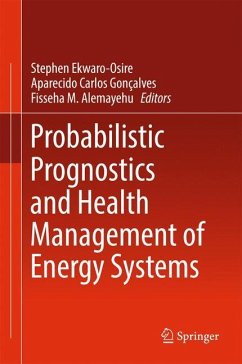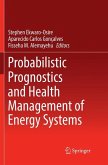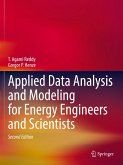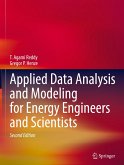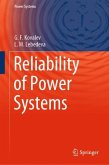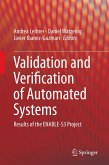Probabilistic Prognostics and Health Management of Energy Systems
Herausgegeben:Ekwaro-Osire, Stephen; Gonçalves, Aparecido Carlos; Alemayehu, Fisseha M.
Probabilistic Prognostics and Health Management of Energy Systems
Herausgegeben:Ekwaro-Osire, Stephen; Gonçalves, Aparecido Carlos; Alemayehu, Fisseha M.
- Gebundenes Buch
- Merkliste
- Auf die Merkliste
- Bewerten Bewerten
- Teilen
- Produkt teilen
- Produkterinnerung
- Produkterinnerung
This book proposes the formulation of an efficient methodology that estimates energy system uncertainty and predicts Remaining Useful Life (RUL) accurately with significantly reduced RUL prediction uncertainty.
Renewable and non-renewable sources of energy are being used to supply the demands of societies worldwide. These sources are mainly thermo-chemo-electro-mechanical systems that are subject to uncertainty in future loading conditions, material properties, process noise, and other design parameters.It book informs the reader of existing and new ideas that will be implemented in RUL…mehr
Andere Kunden interessierten sich auch für
![Probabilistic Prognostics and Health Management of Energy Systems Probabilistic Prognostics and Health Management of Energy Systems]() Probabilistic Prognostics and Health Management of Energy Systems75,99 €
Probabilistic Prognostics and Health Management of Energy Systems75,99 €![Applied Data Analysis and Modeling for Energy Engineers and Scientists Applied Data Analysis and Modeling for Energy Engineers and Scientists]() T. Agami ReddyApplied Data Analysis and Modeling for Energy Engineers and Scientists65,99 €
T. Agami ReddyApplied Data Analysis and Modeling for Energy Engineers and Scientists65,99 €![Applied Data Analysis and Modeling for Energy Engineers and Scientists Applied Data Analysis and Modeling for Energy Engineers and Scientists]() T. Agami ReddyApplied Data Analysis and Modeling for Energy Engineers and Scientists90,99 €
T. Agami ReddyApplied Data Analysis and Modeling for Energy Engineers and Scientists90,99 €![Reliability of Power Systems Reliability of Power Systems]() G.F. KovalevReliability of Power Systems90,99 €
G.F. KovalevReliability of Power Systems90,99 €![New Ways and Needs for Exploiting Nuclear Energy New Ways and Needs for Exploiting Nuclear Energy]() Didier SornetteNew Ways and Needs for Exploiting Nuclear Energy52,99 €
Didier SornetteNew Ways and Needs for Exploiting Nuclear Energy52,99 €![Heat Storage: A Unique Solution For Energy Systems Heat Storage: A Unique Solution For Energy Systems]() Ibrahim DincerHeat Storage: A Unique Solution For Energy Systems97,99 €
Ibrahim DincerHeat Storage: A Unique Solution For Energy Systems97,99 €![Validation and Verification of Automated Systems Validation and Verification of Automated Systems]() Validation and Verification of Automated Systems95,99 €
Validation and Verification of Automated Systems95,99 €-
-
-
This book proposes the formulation of an efficient methodology that estimates energy system uncertainty and predicts Remaining Useful Life (RUL) accurately with significantly reduced RUL prediction uncertainty.
Renewable and non-renewable sources of energy are being used to supply the demands of societies worldwide. These sources are mainly thermo-chemo-electro-mechanical systems that are subject to uncertainty in future loading conditions, material properties, process noise, and other design parameters.It book informs the reader of existing and new ideas that will be implemented in RUL prediction of energy systems in the future.
The book provides case studies, illustrations, graphs, and charts. Its chapters consider engineering, reliability, prognostics and health management, probabilistic multibody dynamical analysis, peridynamic and finite-element modelling, computer science, and mathematics.
Renewable and non-renewable sources of energy are being used to supply the demands of societies worldwide. These sources are mainly thermo-chemo-electro-mechanical systems that are subject to uncertainty in future loading conditions, material properties, process noise, and other design parameters.It book informs the reader of existing and new ideas that will be implemented in RUL prediction of energy systems in the future.
The book provides case studies, illustrations, graphs, and charts. Its chapters consider engineering, reliability, prognostics and health management, probabilistic multibody dynamical analysis, peridynamic and finite-element modelling, computer science, and mathematics.
Produktdetails
- Produktdetails
- Verlag: Springer / Springer International Publishing / Springer, Berlin
- Artikelnr. des Verlages: 978-3-319-55851-6
- 1st ed. 2017
- Seitenzahl: 288
- Erscheinungstermin: 5. Mai 2017
- Englisch
- Abmessung: 241mm x 160mm x 22mm
- Gewicht: 596g
- ISBN-13: 9783319558516
- ISBN-10: 331955851X
- Artikelnr.: 47670651
- Herstellerkennzeichnung Die Herstellerinformationen sind derzeit nicht verfügbar.
- Verlag: Springer / Springer International Publishing / Springer, Berlin
- Artikelnr. des Verlages: 978-3-319-55851-6
- 1st ed. 2017
- Seitenzahl: 288
- Erscheinungstermin: 5. Mai 2017
- Englisch
- Abmessung: 241mm x 160mm x 22mm
- Gewicht: 596g
- ISBN-13: 9783319558516
- ISBN-10: 331955851X
- Artikelnr.: 47670651
- Herstellerkennzeichnung Die Herstellerinformationen sind derzeit nicht verfügbar.
Dr. Stephen Ekwaro-Osire is a full professor in the Department of Mechanical Engineering, and a licensed professional engineer in the state of Texas, USA. He was recently a Fulbright Scholar and the associate dean of research and graduate programs in the Whitacre College of Engineering. Dr. Ekwaro-Osire's research interests are engineering design, wind energy, vibrations, probabilistic prognostics and health management, and orthopedic biomechanics. He has more than 160 refereed publications, 45 of these in archival journals. He has supervised and graduated 32 doctoral and master's students. He is an active member of the American Society for Engineering Education, the American Society of Mechanical Engineers, the Society for Design and Process Science, the American Society of Biomechanics, and the Society for Experimental Mechanics. Dr. Fisseha Meresa Alemayehu received his B.Sc. from Addis Ababa University, Ethiopia, his M.Sc. from TU Delft, The Netherlands and his Ph.D. from Texas Tech University, all in Mechanical Engineering. He joined the School of Engineering, Computer Science and Mathematics in 2016 as an Assistant Professor of Mechanical Engineering. Previously, he has worked as an Assistant Professor at Penn State University for two years and as Post-Doctoral Research Associate at Texas Tech University for one year. He was also a visiting scholar for more than two months in the National Wind Technology Center of National Renewable Energy Laboratory. His research areas include Probabilistic Prognostics and Health Management, Reliability of Renewable Energy Systems, Probabilistic Design, Probabilistic Multibody Dynamic Analysis and Teaching and Assessment Effectiveness. His research outputs have been presented in international as well as national Conferences and workshops and he has published research articles in International Journal of Mechanical Engineering Education, Journal of Mechanical Design, Journal of Computational and Nonlinear Dynamics and in several conference proceedings. Prof. Dr. Aparecido Carlos Gonçalves graduated in Mechanical Engineering by University of Sao Paulo, Brazil in 1989. In 1993 he got a Master Degree, in Metallurgical Engineering, by University of Sao Paulo, Brazil. In 1997 he got his PhD in Mechanical Engineering also by University of Sao Paulo, Brazil. In the past he had actuated in Powder Injection Moulding and was referee of some Journal in the area. Today he is a Professor from University of State of Sao Paulo, Brazil where he was coordinator of Mechanical Project area for six years. He assembled a Laboratory of Oil Analysis and Tribology and now he is the Lab coordinator. He has Projects funded by the three main Grants agencies from Brazil: (FINEP - Fund for Studies and Projects; FAPESP- State of Sao Paulo Research Foundation and CNPq- National Research Council). Nowadays he actuates in Predictive Maintenance, Oil Analysis, vibration Analysis, Tribology andMechanical Project. He is academic advisor and teacher the follow disciplines: Lubricant and Lubrication, Tribology, Predictive Maintenance, Solid Mechanical and Mechanical Design. He has oriented several graduate and undergraduate students.
Part I: Trends and Applications.- Chapter 1. Probabilistic Prognostics and Health Management: A Brief Summary.- Chapter 2. Introduction to Data-driven Methodologies for Prognostics and Health Management.- Chapter 3. Prognostics and Health Management of Wind Turbines - Current Status and Future Opportunities.- Chapter 4. Overview on Gear Health Prognostics.- Chapter 5. Probabilistic Model-Based Prognostics Using Meshfree Modeling.- Chapter 6. Cognitive Architectures for Prognostic Health Management.- Part II Modeling and Uncertainty Quantification.- Chapter 7. A Review of Crack Propagation Modeling using Peridynamics.- Chapter 8. Modeling and Quantification of Physical Systems Uncertainties in a Probabilistic Framework.- Chapter 9. Towards a More Robust Understanding of the Uncertainty of Wind Farm Reliability.- Chapter 10. Data Analysis in Python: Anonymized Features and Imbalanced Data Target.- Chapter 11. The Use of TrendLines Channels and Remaining Useful Life Prediction. Chapter.- 12. The Derivative as a Probabilistic Synthesis of Past and Future Data and Remaining Useful Life Prediction.- Part III Condition Monitoring.- Chapter 13. Monitoring and Fault Identification in Aeronautical Structures Using an Wavelet-Artificial Immune System Algorithm.- Chapter 14. An Illustration of Some Methods to Detect Faults in Geared Systems using a Simple Model of Two Meshed Gears.- Chapter 15. Condition Monitoring of Structures under Non-Ideal Excitation using Low Cost Equipment.- Chapter 16. Maintenance Management and Case Studies in the Luís Carlos Prestes Thermoelectric Power Plant.- Chapter 17. Stiffness Nonlinearity in Structural Dynamics: Our Friend or Enemy?.
Part I: Trends and Applications.- Chapter 1. Probabilistic Prognostics and Health Management: A Brief Summary.- Chapter 2. Introduction to Data-driven Methodologies for Prognostics and Health Management.- Chapter 3. Prognostics and Health Management of Wind Turbines - Current Status and Future Opportunities.- Chapter 4. Overview on Gear Health Prognostics.- Chapter 5. Probabilistic Model-Based Prognostics Using Meshfree Modeling.- Chapter 6. Cognitive Architectures for Prognostic Health Management.- Part II Modeling and Uncertainty Quantification.- Chapter 7. A Review of Crack Propagation Modeling using Peridynamics.- Chapter 8. Modeling and Quantification of Physical Systems Uncertainties in a Probabilistic Framework.- Chapter 9. Towards a More Robust Understanding of the Uncertainty of Wind Farm Reliability.- Chapter 10. Data Analysis in Python: Anonymized Features and Imbalanced Data Target.- Chapter 11. The Use of TrendLines Channels and Remaining Useful Life Prediction. Chapter.- 12. The Derivative as a Probabilistic Synthesis of Past and Future Data and Remaining Useful Life Prediction.- Part III Condition Monitoring.- Chapter 13. Monitoring and Fault Identification in Aeronautical Structures Using an Wavelet-Artificial Immune System Algorithm.- Chapter 14. An Illustration of Some Methods to Detect Faults in Geared Systems using a Simple Model of Two Meshed Gears.- Chapter 15. Condition Monitoring of Structures under Non-Ideal Excitation using Low Cost Equipment.- Chapter 16. Maintenance Management and Case Studies in the Luís Carlos Prestes Thermoelectric Power Plant.- Chapter 17. Stiffness Nonlinearity in Structural Dynamics: Our Friend or Enemy?.

